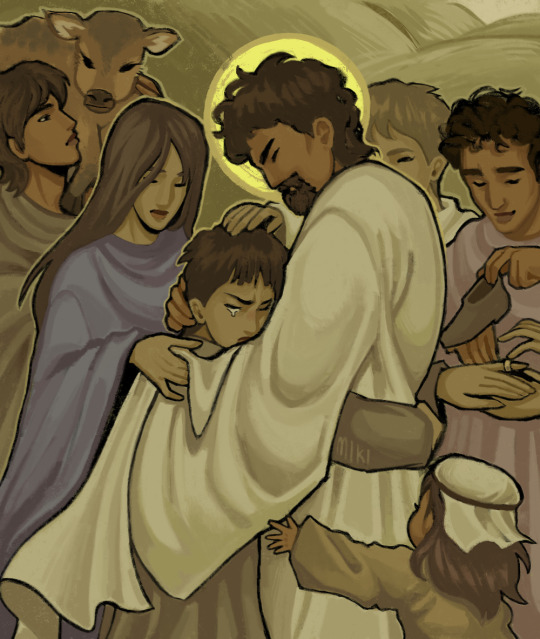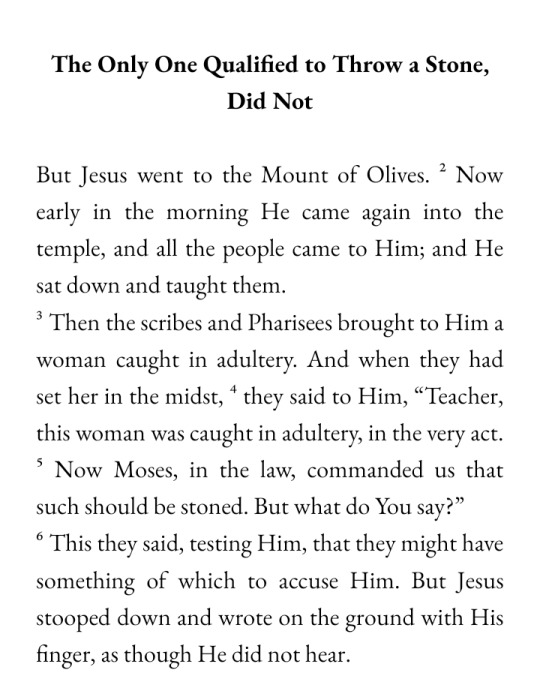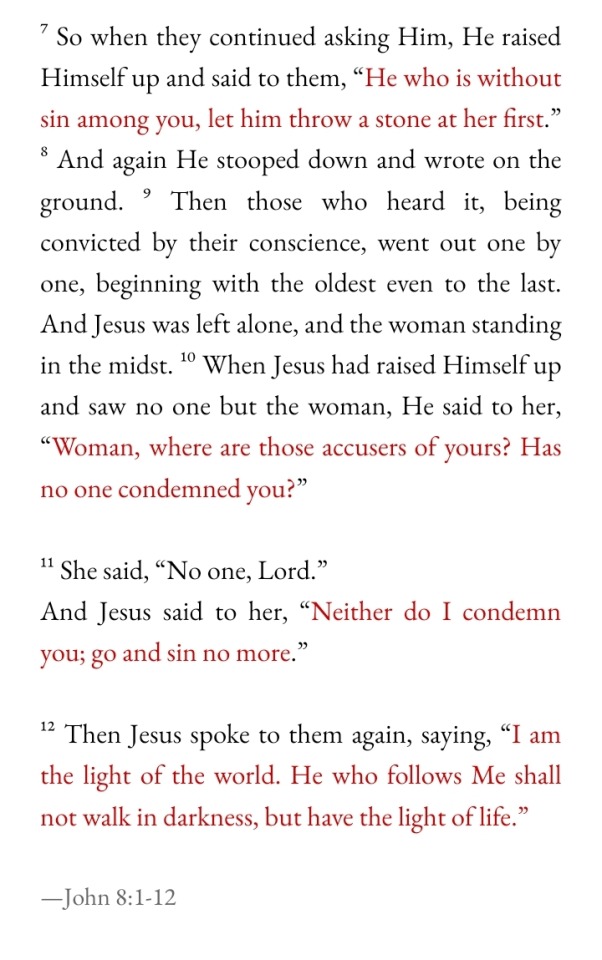#bible story
Explore tagged Tumblr posts
Text
Honestly fuck Abel, and justice for Cain. Anyone who sacrifices newborns deserves to be hit over the head with a rock.
I'd appreciate your fruits and veggies, Cain <3
to be fair to Cain if nobody had ever died before and I didn't know it was possible I would probably also hit my brother over the head with a rock if he was being really annoying
8K notes
·
View notes
Text

"For this my son was dead, and is alive again; he was lost, and is found." Luke 15:24
Though it's not about the birth of Jesus necessarily, The Parable of the Prodigal Son is my favourite passage so I wanted to try to illustrate my favourite moment from it today. Merry Christmas guys! 💛
359 notes
·
View notes
Text

“Daniel's Answer to the King” by Briton Riviere (1890)
#oil on canvas#christian art#Daniel#old testament#Christianity#biblical#art#beautiful#painting#lions#bible#biblia#holy bible#scripture#bible reference#bible study#bible reading#dark academia#art gallery#christian#christian community#prayer#miracles#bible story#God#yhwh
94 notes
·
View notes
Text

Naomi and Ruth
Artist: Evelyn De Morgan (English, 1855–1919)
Date: 1887
Medium: Oil on Canvas
Naomi and Ruth
The story of Naomi appears in the Bible in the book of Ruth. Naomi lived during the time of the judges. She was the wife of a man named Elimelech, and they lived in Bethlehem with their two sons, Mahlon and Kilion. Naomi’s life illustrates the power of God to bring something good out of bitter circumstances.
When a famine hits Judea, Elimelech and Naomi and their two boys relocate to Moab (Ruth 1:1). There, Mahlon and Kilion marry two Moabite women, Orpah and Ruth. After about ten years, tragedy strikes. Elimelech dies, and both of Naomi’s sons also die, leaving Naomi, Ruth, and Orpah widows (Ruth 1:3–5). Naomi, hearing that the famine in Judea was over, decides to return home (Ruth 1:6). Orpah stays in Moab, but Ruth chooses to move to the land of Israel with Naomi. The book of Ruth is the story of Naomi and Ruth returning to Bethlehem and how Ruth married a man named Boaz and bore a son, Obed, who became the grandfather of David and the ancestor of Jesus Christ.
The name Naomi means “sweet, pleasant,” which gives us an idea of Naomi’s basic character. We see her giving her blessing to Ruth and Orpah when she tells them to return to their mothers’ homes so that they might find new husbands: she kisses them and asks that the Lord deal kindly with them (Ruth 1:8–14). But her heartache in Moab was more than Naomi could bear. When she and Ruth arrive in Bethlehem, the women of the town greet Naomi by name, but she cries, “Don’t call me Naomi... Call me Mara, because the Almighty has made my life very bitter. I went away full, but the Lord has brought me back empty. Why call me Naomi? The Lord has afflicted me; the Almighty has brought misfortune upon me” (Ruth 1:20–21). The name Mara means “bitter.” The cup of affliction is a bitter cup, but Naomi understood that the affliction came from the God who is sovereign in all things. Little did she know that from this bitter sorrow great blessings would come to her, her descendants, and the world through Jesus Christ.
Ruth meets a local landowner, Boaz, who is very kind to her. Naomi again recognizes the providence of God in providing a kinsman-redeemer for Ruth. Naomi declares that the Lord “has not stopped showing his kindness to the living and the dead" (Ruth 2:20) Seeing God’s hand in these events, Naomi encourages Ruth to go to Boaz as he slept in the threshing floor in order to request that he redeem her and her property. Naomi’s concern was for Ruth’s future, that Ruth would gain a husband and provider.
Naomi’s bitterness is turned to joy. In the end, she gains a son-in-law who would provide for both her and Ruth. She also becomes a grandmother to Ruth’s son, Obed. Then the women of Bethlehem say to Naomi, “Praise be to the Lord, who this day has not left you without a guardian-redeemer. May he become famous throughout Israel! He will renew your life and sustain you in your old age. For your daughter-in-law, who loves you and who is better to you than seven sons, has given him birth” (Ruth 4:14–15). Naomi was no longer Mara. Her life again became sweet and pleasant, blessed by God.
#naomi#ruth#landscape#women#book of ruth#old testament#christian art#christianity#bible story#emily de morgan#english painter#european#19th century painting
64 notes
·
View notes
Text

#art#painting#oil on canvas#british art#the bible#biblical#bible story#the great flood#book of genesis#old testament#noah´s ark#epic#the deluge#exhibited 1840#francis danby#tate museum
204 notes
·
View notes
Text

Thank You Lord Jesus Christ of Nazareth
#thanksgiving#jesus christ#jesus#jesus loves you#bible scripture#jesussaves#jesusisgod#jesus is coming#faith in jesus#gospel#bible#bible verse#bible study#bible quote#bibleversoftheday#bible stuff#biblestories#bible story#bibleteaching#bibliophile#biblia#faithinchrist#faith in god#christian living#lord jesus christ#jesus loves us#jesuslovesme#jesus loves the little children#christian faith#faith
20 notes
·
View notes
Text

~"Remember, Jonah, God will provide us ways to begin again when we make mistakes."~
Quote has nothing to do with this picture but COME ON! I think of gabby and co sleeping on an ark-shaped bed full of animal plushies and you expect me not to draw that???
81 notes
·
View notes
Text

Elijah Fed By Ravens
#bible#faith#bible scripture#god#christ#jesus#christianity#bible study#scripture#christian#bible story#faith in jesus#jesus christ#jesus loves you#holy spirit#biblical scripture#spirituality#spiritual journey#spiritualgrowth
14 notes
·
View notes
Text
Rainbooooooowwww!

God's promise to never flood the earth again.
I hope someone gets a good laugh from this. :)
13 notes
·
View notes
Text
Sunday is for bible study








#traditional femininity#anti feminism#tradfem#traditional gender roles#traditional motherhood#catholic#catholiscism#biblical femininity#biblical marriage
16 notes
·
View notes
Text




Elizabeth Hurley as Delilah in Samson and Delilah, 1996
#elizabeth hurley#samson and delilah#delilah#biblical stories#bible story#movies#movie gifs#gifset#my gifs#gif edit#gifs#actress#aesthetic
25 notes
·
View notes
Text
So, if anyone had happened to pay attention to my blog description or the stuff that I reblog, you’d know that I am very queer and also very Christian. One of my favorite things to do is to tell Bible stories, and I decided— why the hell not, I’ll post ‘em on here! I decided to come to you all today with the story of Joseph, son of Jacob, who was sold by his own brothers into slavery. Very terrible of them. I’m well aware. It happened kinda like this:
Jacob was this old guy in the old testament. He had four wives— Rachel, Bilhah, Leah, and Zilpah— and eleven kids. And out of all of them, wifey Rachel and his sonny Joseph where his favorites. Rachel, his favorite wife, because that was who he WANTED to marry (the others were added onto the list after a whole buncha mess that would take a long time to get into); and Joseph, the son bore by the wife he really loved. Jacob favored Joseph so much that Joseph’s brothers were jealous of him and hated the very grounds Joseph walked on. Jacob even made Joseph a coat- a coat of many colors, as the bible says. It set him apart from his brothers, and it was hated by his siblings.
Joseph was blessed with a talent of being able to interpret dreams. I guess it made up for whatever he lacked in common sense. For example, once he went to his brothers and told him about a dream he had.
“Hey, guys, I had a weird dream last night,” he said, although it wasn’t very odd to him. He knew what it meant. “We were all out gathering sheaves of grain out in the field, and all the sudden, my sheaf jerked outta my hands and rose upright, and your sheaves all jerked outta your hands, too, and bowed around mine! Isn’t that… Weird?” He gulped, because all the sudden, his brothers looked like they wanted to absolutely murder him.
“You sayin’ that one day, you’re gonna rule over us?” They growled, because they absolutely wanted to murder him. Joseph had enough sense to keep his trap shut at that and shuffled off.
A while later, Jacob sent Joseph to go get his brothers and bring them home, because they were out in the field, doing farmerly things. They saw Joseph coming in the distance, and they all decided that they were sick of him and his stupid coat, so they plotted to kill him.
“Here comes the dreamer,” one of them said, mockingly. “Let’s just kill him and throw him into one of the dry wells. No one would know about it, and we can just say an animal killed him and ruin that stupid jacket as proof, easy peasy.”
Reuben, the eldest, turned a little pale. See, he hated Joseph himself, but he didn’t want to kill the guy. “Um… How ‘bout we, uh, not kill him? Just throwing that out there.” He said, nervously. “Lets just take the jacket and throw him into the well. Leave him there. Lets not get his blood on our hands.” Well, really, Reuben didn’t want Joseph’s blood on HIS hands. He intended on going back to the well and saving Joseph and leading him back.
A bit later, Joseph approached them.
“Hey, guys!” Joseph said, brightly, as the bloodthirsty figures of his brothers loomed over him. “Dad wants you guys back home, how much longer d’ya think you’ll be- ACK!”
The “ack” being the sound of Joseph’s brothers grabbing him, yanking off his coat, and tossing him into the well. For funnies, imagine that little cartoon sound effect that’s used when a character falls off a cliff.
They left Joseph there, who was pretty much screaming, begging, pleading, and crying for his brothers to let him out, and went to go eat a meal— excluding Reuben, who was out biding some time before he went to save Joseph. As they were eating, they caught sight of some Ishmaelites passing through.
“Hey, here’s a thought,” Judah said, his voice thick with food, “How ‘bout we sell him? That way, his blood ain’t on our hands, we’re a couple pieces of silver richer, AND we get rid of him. I mean, he is our own brother. Might as well show a little mercy and sell him into slavery.”
His brothers grunted in agreement, and when they finished, they went back to the well.
“You came back!” Joseph hiccuped, a bruised, tear-stained and dirty mess, relief settled in his eyes. “I prayed you would! You can have the jacket, if you don’t like it- Huh?”
And then they sold Joseph for twenty pieces of silver.
When Reuben found Joseph wasn’t there, he freaked out. “What am I gonna do now? This is gonna kill Dad!” He stressed, but his brothers had already taken the coat and smeared it with animals blood. When they presented it to Jacob, he thought that Joseph was killed by some animals, and he tore his clothes and went deep into mourning. When his children and many wives tried to comfort him, he refused it. He said that he’d never stop mourning his son until he was dead right along with him.
Meanwhile, the Ishmaelites went and sold Jacob away to Egypt for slavery. To Potiphar, to be exact, who was one of the officials for the Pharaoh.
You can read the story for yourself in Genesis, Chapter 37: verses 1 through 36 in the Bible! :D
7 notes
·
View notes
Text


#Jesus Christ#gospel#John#holy bible#new testament#bible study#bible reading#bible verse#bible quotes#bible#scripture#christianity#christian#christians#christian faith#faith#faith in God#faith in Jesus#christian encouragement#christian quotes#Jesus#Christ#christian living#christian blog#biblia#nkjv#bible story#bible quote#bible scripture#God
91 notes
·
View notes
Text

The Miracles of Prophet Elisha
Artist: Giorgio Vasari (Italian, 1511-1574)
Date: c. 1566
Medium: Oil on Wood
Collection: Galleria degli Uffizi, Florence
Description
This composition is a typical example of a painting for private worship, a genre that was popular with Vasari. The subject is a scene from the life of the Prophet Elisha, who during famine saved his people making edible wild herbs. Elisha is one of the biblical prophets whose miracles prefigured those of Christ. A man in the middle ground carries a basket, because Elisha miraculously multiplied the available food.
In spite of the modest size of the work, the artist insists on elaborating a composition of great complexity and refinement, characteristics which would reappear in the profane paintings of the Studiolo executed thirty years later.
Death in the Pot | 2 Kings 4: 38-41, NIV
Elisha returned to Gilgal and there was a famine in that region. While the company of the prophets was meeting with him, he said to his servant, “Put on the large pot and cook some stew for these prophets.”
One of them went out into the fields to gather herbs and found a wild vine and picked as many of its gourds as his garment could hold. When he returned, he cut them up into the pot of stew, though no one knew what they were. The stew was poured out for the men, but as they began to eat it, they cried out, “Man of God, there is death in the pot!” And they could not eat it.
Elisha said, “Get some flour.” He put it into the pot and said, “Serve it to the people to eat.” And there was nothing harmful in the pot.
#painting#prophet elisha#christianity#old testament#giorgio vasari#holy bible#bible story#oil on wood#bible miracles#faine#food#israel#men#distant landscape#steps#italian painter#european art#table#pots#stew#book of 2 kings#christian art
37 notes
·
View notes
Text
This is an aspect of this time-honored story that sometimes troubles me, and I know that different Biblical scholars as well as different lay people have very different views on it.
Note #1: Please don't reblog with answers that only relate to adaptations of the story. For example, "What he does is wrong, but his wife Asenath calls him out on it and urges him to forgive them." Not in the Bible she doesn't. No one calls him out in the original text.
Note #2: Christians are free to reblog and offer opinions – this is a Biblical subject after all – but please don't preach to me about Jesus. This story isn't about Jesus. It predates Jesus by many centuries. Besides, for the time being, I'm looking at it more from a character analysis perspective than a religious perspective.
Note #3: Please don't be antisemitic. The (arguable) moral grayness of Hebrew Bible/Old Testament heroes has nothing to do with either their Jewishness or the fact that they lived before Jesus.
#the bible#hebrew bible#old testament#joseph son of jacob#joseph#joseph and the amazing technicolor dreamcoat#joseph king of dreams#joseph the dreamer#christianity#judaism#character analysis#bible story#poll
16 notes
·
View notes
Text

Guess What?
JESUS LOVES YOU
Holy Scripture: John 3:16
#jesus#jesus christ#jesus loves you#bible#bible scripture#gospel#jesussaves#jesusisgod#jesus is coming#faith in jesus#messiah#god#yahweh#holy spirit#bible quote#bibliophile#bible stuff#bible study#bible story#bible verse#biblestories#word of god#word of faith#word of the week#word of the day#word of honor#wordsofwisdom#jesusislord#jesus is the only way#jesus is king
13 notes
·
View notes